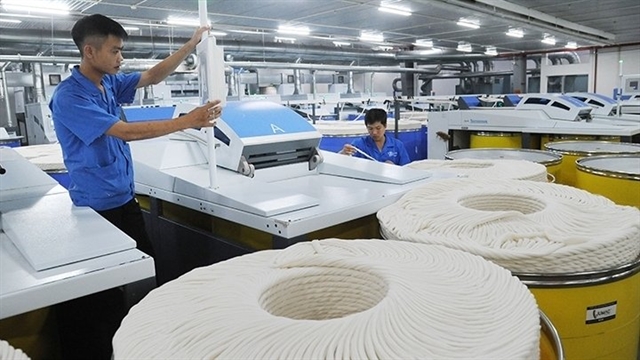
HÀ NỘI — India has decided to not impose anti-dumping duties on some viscose spun yarn products imported from Việt Nam, according to the Ministry of Industry and Trade's Trade Remedies Authority of Việt Nam.
The authority received information on Thursday about the Indian Ministry of Finance's decision to not impose anti-dumping duties on those products originating or imported from China, Indonesia and Việt Nam.
Viscose spun yarn contains 85 per cent or more of artificial viscose staple fibre than sewing thread and is mainly used for weaving or knitting for production of fabric.
Previously, on December 30, 2020, the Directorate General of Trade Remedies under the Indian Minister Commerce and Industry issued the final investigation conclusion No 6/41/2019-DGTR which proposed that the Ministry of Finance of India impose taxes of US$0.25-0.8 per kg on the products under investigation.
For products from Việt Nam, the proposed anti-dumping duty was $0.41 per kg.
The case was initiated on January 14, 2020, by the Indian Manmade Yarn Manufacturers Association, accusing artificial fibres originating or imported from China, Indonesia and Việt Nam were dumped on India.
Products subject to this investigation were under the HS codes 5510.11.10; 5510.12.10; 5510.11.90; 5510.90.10; and 5510.90.90.
The injury investigation period covered the 2016-19 period.
The association alleged that material injury to the domestic industry was being caused due to dumped imports from Việt Nam, China and Indonesia and requested imposition of antidumping duties on the imports of the goods.
The Indian association claimed that the subject goods, which were being dumped into India, were identical to the goods produced by the domestic industry, stressing there were no known differences either in the technical specifications, quality, functions or end-uses of the dumped imports.
According to the Việt Nam General Department of Customs, Việt Nam's total export turnover of products under this investigation stood at $9.7 million in 2019, a year-on-year increase of 78 per cent compared to 2018. — VNS
Xem thêm: lmth.serbif-esemanteiv-rof-seitud-gnipmud-itna-sevomer-aidni/169249/ymonoce/nv.swenmanteiv